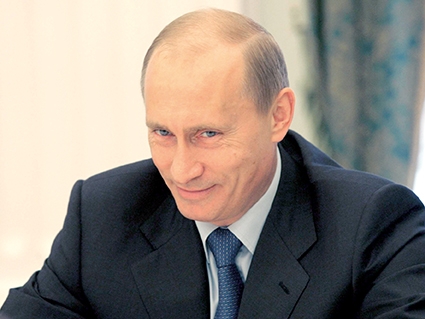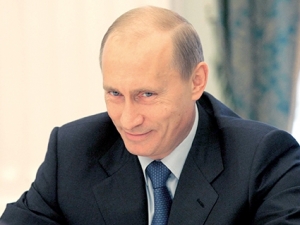Propaganda as a Weapon
In 1991, when Georgia declared independence as the Soviet Union fell apart, a war between Georgia and separatists left parts of the former South Ossetian Autonomous Oblast under the de facto control of Russian-backed but internationally unrecognized separatists, with a similar situation developing in the region of Abkhazia.
Then, in 2000, when Putin rose to power, and with Georgia having a pro-Western outlook, tension between Russia and Georgia began to grow. By August 2008, pro-Russian separatists had begun shelling Georgian villages, breaking a 1992 ceasefire agreement. To put an end to these attacks and restore order, the Georgian Army was sent to the breakaway region conflict zone on 7 August and took control of most of Tskhinvali. Russian troops then crossed the Russo-Georgian state border and advanced into the South Ossetian conflict zone. Russia joined the fight with the separatists against the Georgian military with the pretext of peace enforcement, blaming Georgia for the aggression. After several days, the Georgian forces retreated, after which Russia proceeded to target and destroy undisputed parts of Georgia, setting in motion an ethnic cleansing of Georgians. Russia withdrew from undisputed parts of Georgia, yet occupied and recognized the independence of the breakaway regions of Abkhazia and South Ossetia, leaving Russia's international relations largely unharmed.
Why did all this happen, and how?
First of all, Transcaucasia lies between the Russian region of the North Caucasus and the Middle East, the strategic importance of the region making it a target for Russia. Significant economic advantages, such as the presence or transportation of oil, also affect interest in Transcaucasia. In addition, occupying Transcaucasia would ultimately allow Russia to manage Western involvement in Central Asia. The Russians knew this even before the 2008 War. Georgian President Giorgi Margvelashvili stated on 7 August 2018 that Russia had attempted to split Abkhazia, South Ossetia, and Georgia decades before the South Ossetian conflict.
So why is there still tension after 10 years?
Georgia has reached a critical point in time, economically and culturally. At this point, the nation is also very sensitive and vulnerable. Like a growing child, it needs proper guidance and trusting relationships. Georgia has been gaining attention worldwide, and with EU-Georgia relations becoming increasingly positive, Putin has been losing his grip in Georgia. With NATO membership getting closer, he will soon lose his chance to gain a strategic advantage against the West. What options does he have left in order not to lose such a precious chance at strategic advantage? Propaganda.
The Georgian President knows this and stated the following: “The background of Russia’s decisions differs from the speculations used by Russian propaganda, which try to connect what happened in 2008 to NATO or the European Union. These decisions were fuelled by Georgia’s attempt to become a sovereign and independent country, by Georgia’s decision to rule its own destiny,” Giorgi Margvelashvili stated.
Propaganda, if used correctly, can be a powerful weapon of war, as we learned in WWII; Putin knows this and has been utilizing it for years. This is evident in a poll done by independent company Levada Center, which shows us that 34% of polled Russians who are familiar with the conflict said they hold the Georgian leadership liable, and 24% of the respondents accusing the United States and NATO of starting the war. Only 8% of respondents named Russia the aggressor in the war, the majority believing Russia did its utmost to avoid bloodshed. A staggering 18% of Levada’s poll respondents stated that they were hearing about the war for the first time, while overall 56% said they had simply “heard something about it”. This poll was done in July this year.
Lev Gudkov, head of Levada, stated that this is all due to the fact that after the conflict ended, the media was severely restricted from broadcasting any information about Georgia, either negative or positive. Gudkov argued that anti-Georgian propaganda and a lack of post-war news from Georgia shaped public opinion today, and he’s right. Propaganda used correctly can be both the rise of an empire or the demise of one.
As recent as 8 August 2018, Russia’s biggest rock festival was boycotted by musicians due to the fact that the Ministry of Defense had a massive presence there. When using propaganda as a weapon, you want exposure to be at a maximum level; you want to saturate your audience so that they cannot look away even if they want to. This completely backfired however, as military hardware was on display to the 200,000 music fans at the Nashestviye festival, with some artists calling the show a propaganda stunt.
Putin wants the strategic advantage and he is getting desperate to obtain it, threatening Georgia and the US, stating that there will be dire consequences to NATO membership for Georgia, ultimately justifying it by saying it is a security risk. Georgia’s membership in NATO would indeed be a huge security risk for Russia, if its leader’s objective is to occupy the whole Transcaucasia.
Propaganda, if used correctly, is a malicious and downright insidious way of twisting and perverting the human right to freedom of speech; however, it will be the downfall of Russia. People will soon realize that what they see and hear is only a husk of the reality; reality that has been manipulated by one man’s objective of gaining more power, and that truth will reign supreme.
By Shawn Wayne












